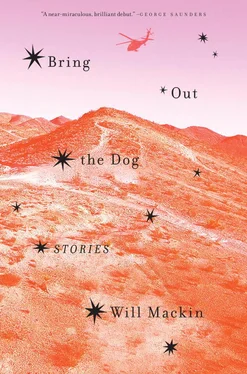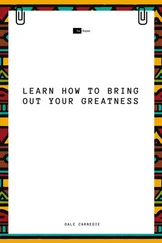Will Mackin - Bring Out the Dog
Здесь есть возможность читать онлайн «Will Mackin - Bring Out the Dog» весь текст электронной книги совершенно бесплатно (целиком полную версию без сокращений). В некоторых случаях можно слушать аудио, скачать через торрент в формате fb2 и присутствует краткое содержание. Город: New York, Год выпуска: 2018, ISBN: 2018, Издательство: Random House Publishing Group, Жанр: prose_military, на английском языке. Описание произведения, (предисловие) а так же отзывы посетителей доступны на портале библиотеки ЛибКат.
- Название:Bring Out the Dog
- Автор:
- Издательство:Random House Publishing Group
- Жанр:
- Год:2018
- Город:New York
- ISBN:978-0-812-99564-0
- Рейтинг книги:5 / 5. Голосов: 1
-
Избранное:Добавить в избранное
- Отзывы:
-
Ваша оценка:
- 100
- 1
- 2
- 3
- 4
- 5
Bring Out the Dog: краткое содержание, описание и аннотация
Предлагаем к чтению аннотацию, описание, краткое содержание или предисловие (зависит от того, что написал сам автор книги «Bring Out the Dog»). Если вы не нашли необходимую информацию о книге — напишите в комментариях, мы постараемся отыскать её.
Bring Out the Dog — читать онлайн бесплатно полную книгу (весь текст) целиком
Ниже представлен текст книги, разбитый по страницам. Система сохранения места последней прочитанной страницы, позволяет с удобством читать онлайн бесплатно книгу «Bring Out the Dog», без необходимости каждый раз заново искать на чём Вы остановились. Поставьте закладку, и сможете в любой момент перейти на страницу, на которой закончили чтение.
Интервал:
Закладка:
I listened for those dogs through the window propped open by the roll of foam rubber while starlight squeezed into the room. It spilled out the doorway and into the hall. Faint sounds of an orderly, if unproductive, search arrived from the surrounding darkness—a dresser drawer sliding open, a closet hinge squeaking. Someone tapped a finger against a wall, hunting for voids. We’d been inside that house for thirty minutes, and if we hadn’t found anything yet, we weren’t going to.
Tull, on his way upstairs, passed the door to the room where I was guarding the feathers. I followed him into the hall.
“Hey,” I said.
Tull turned around. His beard looked like a wood carving of a beard. “Yeah?” he asked.
“Tell Zsa-Zsa to ask the kid about Ali,” I said.
“Who the fuck’s Ali?”
“They’re talking about him in there,” I said, thumbing back toward the feathers. “I think he’s the kid’s brother. But he could also be our cameraman.”
Tull nodded and continued down the hall. I returned to guard the feathers.
“Ali is upstairs, asleep in bed,” the grandmother told me when I walked into the room.
“No, Mama,” the mother said. “Ali is with his family in Baghdad.”
“Why are you here?” the older daughter asked me.
It was almost one A.M. on a Saturday. The insurgents’ grim campaign against the Iraqi police had begun the previous Wednesday. That morning, six cops had vanished from their station in northeast Hit. That night, their bodies had been found in the bitumen mines north of Hit. Thursday morning, insurgents had posted the first video online.
That video showed six cops, blindfolded and kneeling at the edge of a pit, as a hooded gunman went down the line, shooting each man in the back of the head. Our analysts had traced the video’s origins to an Internet café in the south end of town. We’d broken into that café on Thursday night.
The café was the size of a broom closet. Two computers were jammed atop a school desk inside. I’d sat in a little kid’s chair. The ghost drive I’d used to copy all the files had chirped like a sparrow at a birdbath. It had whirred like that same sparrow shaking water off its back. The download had taken a lot longer than I’d thought. Meanwhile, the dogs, waiting for us on the edge of town, had remained silent.
Back at the outpost, early Friday morning, I’d sifted through the files that I’d ghosted from the café. I’d found the original file of the first video. Then I’d searched for other videos taken by the same phone, ones that had been downloaded onto the café computer but not uploaded onto the Web. That was how I’d found the second video—recorded on Thursday morning, according to the time stamp—which appeared to show the execution of a seventh cop.
The second video begins in the cop’s kitchen as the insurgents struggle to remove him from his breakfast table. I counted four insurgents including the cameraman, who, it seemed, had inadvertently begun recording during the melee. Most of the scene in the kitchen is a blur, except for a brief look at an oval of flatbread on a green plate and a peek at steam rising from a coffeepot on the stove. “Fuck your sister,” the cop says, seemingly through his teeth. Next comes a long stare at a puddle of milk on the kitchen’s linoleum floor, accompanied by sounds of the cop choking. Then everybody files out the back door.
Brick stairs descend into a brick courtyard. The cameraman almost shuts the camera off, thinking he needs to turn it on, but it’s already recording. Realizing his mistake, he says, “Shit!”
The cameraman focuses on the seventh cop, breathing hard and bleeding from his nose. He’s kneeling before a thick vine, heavy with blue flowers. An insurgent, at the edge of the landscape frame, holds up something for the cop to read. The cameraman zooms in on the cop’s face. The cop’s green eyes scan the text. “Out loud,” the insurgent tells him. The cop looks directly at the camera, and says, “Here I am in my little garden with morning glories.”
The cameraman drops the phone, and it lands lens down on the bricks. The resulting darkness is maroon. A pistol fires. Shoes scuffle. “You missed it!” says one of the insurgents. “Fuck me,” the cameraman says, picking up the phone. It records a split second of morning glories creeping over a wall, then a tall cloud, in the background, tinted pink by the sunrise. The cameraman shoves the phone into his pocket while it’s still recording. The video goes dark again. The audio continues, though, with sounds of the cameraman running behind the other insurgents—into the kitchen, through the house, and out the front door. A getaway car idles roughly. The cameraman climbs in. Doors slam, and the insurgents drive away.
Gears grind and brakes squeal. The insurgents drive for less than a minute, without talking, before they come to a puttering stop. The cameraman gets out. “Peace,” he says to the others, and the car door closes behind him.
The cameraman’s brothers-in-arms drive away, shifting into second, then third. The cameraman, I imagine, must’ve watched them go. He must’ve wished that he’d had the chance to explain what had happened, back there, with the camera. He must’ve wanted to hear his comrades say that it would be fine, that there’d be other chances. During the getaway, the cameraman would’ve watched them closely for signs of lost trust. Perhaps they’d shown no signs, they just wouldn’t return. While the cameraman considers this, the audio features static. Then a gate with a metal latch opens and closes. The cameraman removes his phone from his pocket. There’s a flash of him with the rising sun in the background; then the image steadies on a patch of hard dirt. The cameraman realizes that he’s been recording this whole time. “Fuck me,” he says again, and the video ends.
Rewinding just five seconds, to the part before the patch of hard dirt, where the cameraman’s silhouette flashed, I’d discovered a cellphone tower standing behind him. Intel found five such towers in Hit. Knowing the height of those towers and the position of the sun in the sky at that time of day, they were able to triangulate five possible locations for the cameraman. Cross-referencing those locations onto satellite imagery, they’d discovered that two of them were in gated courtyards with dirt surfaces. Zsa-Zsa had flipped the coin to decide which one we’d go to. I’d called heads as it ascended.
It appeared, however, that I should’ve called tails. The feathers, I’m sure, would’ve agreed. But they no longer seemed to care why I was there. They just wanted me and the rest of the troop to leave, thereby returning their house and their lives to them.
Tull passed the open door going the other way, followed by Zsa-Zsa, who stuck his head into the room.
“Last man,” Zsa-Zsa said to me.
I told the feathers to stay, in English; then I pointed at my watch and held up ten fingers. They gave me blank looks. I held my hand out, like, Stay. The mother nodded and patted the grandmother’s leg. The older daughter explained what I meant to the younger: Stay put for ten minutes. I followed Zsa-Zsa out of the room and down the stairs.
The living room’s velvet curtains conjured disgraced royalty. The grease stains on the kitchen walls resembled Rorschach tests. I exited through the back door, into the courtyard, to find the troop filing through the gate into the alley. They were turning east, away from the desert and our rendezvous with the helicopters.
I walked over to Tull, who was standing where the cameraman would’ve been at the moment he realized that his phone had recorded the entire getaway.
“Are we going to the other place?” I whispered.
“Yeah,” Tull said.
Читать дальшеИнтервал:
Закладка:
Похожие книги на «Bring Out the Dog»
Представляем Вашему вниманию похожие книги на «Bring Out the Dog» списком для выбора. Мы отобрали схожую по названию и смыслу литературу в надежде предоставить читателям больше вариантов отыскать новые, интересные, ещё непрочитанные произведения.
Обсуждение, отзывы о книге «Bring Out the Dog» и просто собственные мнения читателей. Оставьте ваши комментарии, напишите, что Вы думаете о произведении, его смысле или главных героях. Укажите что конкретно понравилось, а что нет, и почему Вы так считаете.












